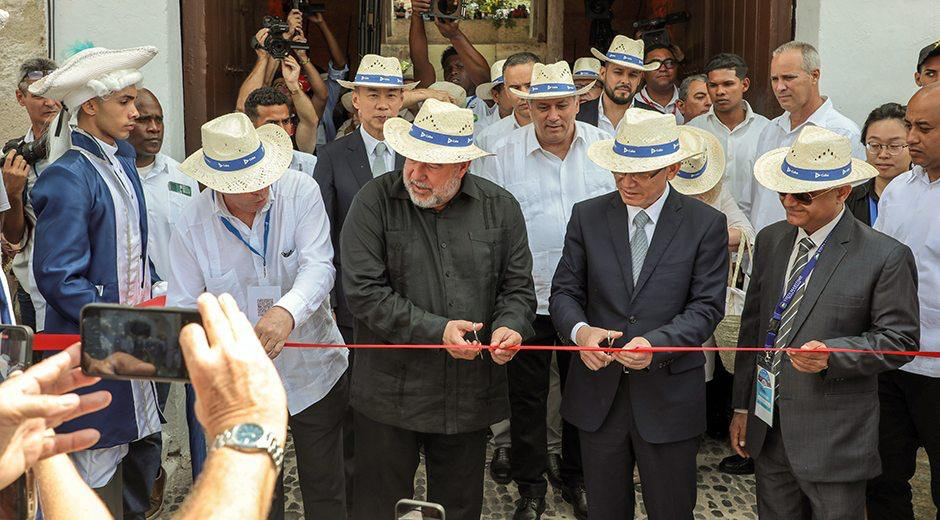쿠바의 관광 부흥 전략 개요
쿠바는 관광 산업 부흥을 위한 종합적인 전략의 일환으로 관광 부문에 활력을 불어넣기 위한 과감한 조치를 취하고 있습니다. 최근 발표에 따르면 중국과의 파트너십을 통해 아바나에 호텔을 운영할 예정이며, 더 많은 방문객을 유치하기 위한 다른 중요한 조치도 함께 발표했습니다. 이러한 변화는 쿠바의 경제 회복을 위해 관광업이 매우 중요한 시기에 이루어졌습니다.
관광 활성화를 위한 주요 이니셔티브
이 이니셔티브의 주요 내용 중 하나는 공항에서 관광객에게 부과되던 $30의 건강 수수료 면제로, 여행객의 재정적 부담을 완화하고 쿠바 방문의 매력을 높일 수 있는 결정입니다. 또한, 쿠바는 이제 캐나다 달러와 유로화 결제를 허용하여 입국 관광객의 통화 선택의 폭을 넓힐 예정입니다.
파트너십에 집중
쿠바 총리는 국제 관광 박람회(FitCuba)에서 중국과의 협력을 소개하며 핵심 파트너로서 중국의 중요성을 강조했습니다. 올해 박람회에는 2,000명의 현지 대표와 함께 850명의 해외 참가자가 참가하여 관광 산업 재건에 대한 새로운 관심을 보여주었습니다. 하이라이트는 베이징에 코파카바나 호텔을 임대하는 것으로, 이는 양국 관계 강화를 위한 발걸음을 내딛는 것을 의미합니다.
비자 개혁
또한 비자 규정이 변경되어 2024년부터 중국발 일반 여권을 소지한 여행객에 대한 비자 요건이 폐지됩니다. 이러한 결정은 쿠바가 해외 관광객을 유치하기 위한 쿠바의 전략을 반영한 것입니다.
환전 및 항공 여행 옵션 강화
총리는 또한 공항의 환전 서비스 개선과 11월에 취항할 예정인 독일 직항 노선과 같은 새로운 항공 노선 개설 계획도 발표했습니다. 이러한 개선으로 여행객들은 교통 옵션과 금융 거래와 관련하여 더 많은 유연성을 확보할 수 있게 되었습니다.
투자를 위한 경제 특구
외국인 투자를 촉진하기 위해 경제특구 조성도 곧 시작될 예정입니다. 마리엘과 같은 경제특구는 과거에는 기대만큼의 관심을 끌지 못했지만, 투자자를 유치하기 위해 더 많은 인센티브를 제공할 계획입니다. 이들 경제특구에서 10년간 매년 약 1조 4,000억 달러의 투자가 예상되었지만, 실제 수치는 이에 미치지 못해 보다 효과적인 전략이 필요하다는 것을 보여주고 있습니다.
쿠바 관광의 미래
관광업의 전망이 하루아침에 개선되지는 않겠지만, 쿠바 정부의 이니셔티브는 가시적인 해결책으로 지속적인 문제를 해결하는 것을 목표로 하고 있습니다. 총리는 문제가 지속되고 있지만 이러한 정의된 단계는 앞으로 나아가는 데 매우 중요하다고 강조했습니다.
관광 분야에서의 폭넓은 협업
마레로는 전통적인 태양과 해변 관광을 넘어 생태 관광, 문화 투어, 스포츠 관련 활동으로 상품을 확장하는 것이 중요하다고 강조했습니다. 관광 경험의 다양화에 중점을 두는 것은 더 많은 관광객을 유치하고 방문객 수를 늘리는 것을 목표로 합니다.
남은 과제
이러한 조치에도 불구하고 2025년 목표인 260만 명의 방문객을 달성하기는 어려울 것이라는 전망이 나오고 있습니다. 3월 말까지 여행객 수는 571,772명에 그쳤는데, 이는 같은 기간 전년 대비 301만 3,000명이 감소한 수치입니다. 놀랍게도 주요 원천 시장 중 어느 곳도 방문객 수를 늘리지 못해 관광 산업에 더 큰 부담을 주고 있습니다.
민간 부문의 좌절
관광객 감소로 인해 많은 외국인용 임대주택과 호스텔이 문을 닫거나 비즈니스 모델을 전환하는 등 민간 임대 부문도 어려움을 겪고 있으며, 이러한 문제는 국영 기업에만 국한된 것이 아닙니다. 보도에 따르면, 에어비앤비는 최근 임대인 계정이 새로운 연방 규정을 준수하도록 조정되지 않으면 쿠바에 대한 대금 지급을 중단했습니다.
결론
요약하자면, 쿠바의 중국과의 호텔 경영 파트너십 전략은 관광 부문을 활성화하기 위한 다양한 제안과 함께 경기 회복과 성장을 위한 종합적인 접근 방식을 반영하고 있습니다. 이러한 조치의 결과는 아직 지켜봐야 하지만, 여행자와 투자자 모두에게 쿠바 관광의 급성장하는 옵션을 탐색할 수 있는 기회를 제공합니다.
가장 포괄적인 분석과 진정한 피드백조차도 개인적인 경험에 비하면 무색해집니다. GetTransfer.com에서 사용자는 검증된 공급업체의 운전기사가 포함된 차량을 경쟁력 있는 가격으로 렌트할 수 있습니다. 이를 통해 여행자는 큰 비용을 들이지 않고도 정보에 입각한 선택을 할 수 있습니다. 이 플랫폼은 모든 여행 요구 사항을 충족하는 다양한 차량 옵션과 추가 서비스를 선보이며 여행 중 번거로움을 최소화합니다. 차량 서비스 예약하기 GetTransfer.com 오늘!

 쿠바, 호텔 경영을 통한 관광산업 발전을 위해 중국과 파트너십 체결">
쿠바, 호텔 경영을 통한 관광산업 발전을 위해 중국과 파트너십 체결">

댓글